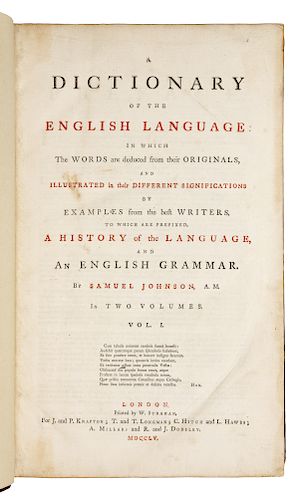JOHNSON, Samuel (1709-1784). A Dictionary of the English Language: in which the words are deduced from their originals, and illustrated in their diffe
Lot 49
About Seller
Hindman
1338 West Lake Street
Chicago, IL 60607
United States
Recognized as the Midwest's leading fine art auctioneers, Hindman Auctioneers has built a worldwide reputation based on a full service approach to the auction business tailored to meet the individual needs of our clients. Coming from a variety of educational backgrounds, specialists bring years of e...Read more
Categories
Estimate:
$10,000 - $15,000
Absentee vs Live bid
Two ways to bid:
- Leave a max absentee bid and the platform will bid on your behalf up to your maximum bid during the live auction.
- Bid live during the auction and your bids will be submitted real-time to the auctioneer.
Bid Increments
| Price | Bid Increment |
|---|---|
| $0 | $25 |
| $500 | $50 |
| $1,000 | $100 |
| $2,000 | $250 |
| $5,000 | $500 |
| $10,000 | $1,000 |
| $20,000 | $2,500 |
| $50,000 | $5,000 |
| $100,000 | $10,000 |
About Auction
By Hindman
Nov 5, 2019
Set Reminder
2019-11-05 11:00:00
2019-11-05 11:00:00
America/New_York
Bidsquare
Bidsquare : Library of a Midwestern Collector
https://www.bidsquare.com/auctions/hindman-auctions/library-of-a-midwestern-collector-4496
Hindman Bidsquare@hindmanauctions.com
Hindman Bidsquare@hindmanauctions.com
- Lot Description
JOHNSON, Samuel (1709-1784). A Dictionary of the English Language: in which the words are deduced from their originals, and illustrated in their different significations by examples from the best writers. London: W. Strahan for J. and P. Knapton, T. and T. Longman, C. Hitch and L. Hawes, A. Millar, and R. and J. Dodsley, 1755.
2 volumes, folio (412 x 254 mm). Titles printed in red and black, woodcut tail-pieces. (Title-pages neatly reinserted, a few pale spots, otherwise fine.) Contemporary sprinkled calf, edges sprinkled red (rebacked preserving original spines, endpapers renewed, corners repaired, some light scuffing). FIRST EDITION OF JOHNSON’S GREATEST LITERARY ACHIEVEMENT, and “the most amazing, enduring and endearing one-man feat in the field of lexicography" (PMM). Johnson included “the entire sweep of words from the crude and demotic to ... recent fanciful forms imported from other languages" (DNB). “The preface ranks among Johnson’s finest writings… It is the dictionary itself which justifies Noah Webster’s statement that ‘Johnson’s writings had, in philology, the effect which Newton’s discoveries had in mathematics'” (PMM). Johnson’s work was the first in the English language to combine into one text what we now expect from a dictionary: he codified the spelling of English words and provided clear definitions of their meanings. As he notes in the preface, he encountered many difficulties during production, as the dictionary "was written with little assistance of the learned, and without any patronage of the great; not in the soft obscurities of retirement, or under the shelter of academick bowers, but amidst inconvenience and distraction, in sickness and in sorrow." Its success as a dictionary was unprecedented. Alston V, 177; Courtney and Smith p. 54; Chapman and Hazen p. 137; Fleeman I, p. 410; Grolier English 50; PMM 201; Rothschild 1237.
For condition inquiries please contact Gretchen Hause at gretchenhause@hindmanauctions.comCondition
- Shipping Info
-
Please refer to https://hindmanauctions.com/shipping-packing
-
- Buyer's Premium



 EUR
EUR CAD
CAD AUD
AUD GBP
GBP MXN
MXN HKD
HKD CNY
CNY MYR
MYR SEK
SEK SGD
SGD CHF
CHF THB
THB









![1667 Land Deed [Massachusetts Bay Colony / Boston] on Parchment](https://s1.img.bidsquare.com/item/m/2949/29492002.jpeg?t=1TIB0e)


